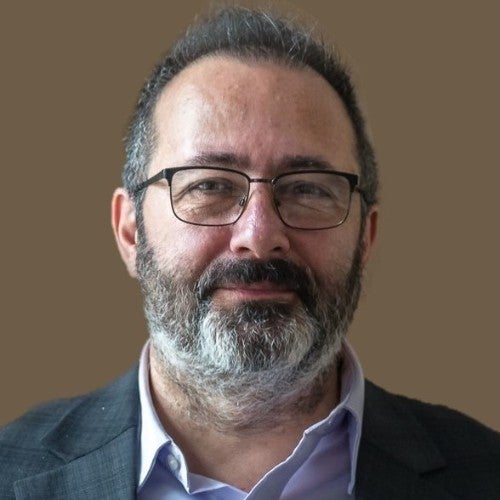“AI can amplify both human knowledge and stupidity” – interview with visiting professor at CIAS

Viktor Dörfler has taught various subjects in information and knowledge management at the University of Strathclyde Business School in Scotland for twenty years. His research interests include topics related to increasing the knowledge of AI software and strategy-building methods for decision makers. In his book What Every CEO Should Know About AI, published last year, he shows, among other things, how the amplifying effect of AI works:
“To put it very simply, if you put this tool in the hands of a stupid person, it amplifies stupidity, but if you put it in the hands of an intelligent person, it amplifies the knowledge of the person using it.”
That’s why, the researcher says, it’s important for CEOs to understand that within a company, it makes sense to assign AI to areas of the operation where more complex problems need to be solved to make sure that skilled professionals are engaged in it. The researcher, who also worked on the development of an artificial intelligence software, does not fear that AI will replace entire professions, but sees it as an opportunity, as outsourcing more tedious workflows will leave more time for creative thinking.

A visiting professor at CIAS since September, he sees the institute as a Renaissance-style workshop where different researchers can interact productively. As an example, he mentions the ethical aspects of artificial intelligence, for whose research he has explored new perspectives through discussions with colleagues at the institute.
Viktor Dörfler is mainly working on his grandmaster project during his four-month research fellowship in Budapest. The project has involved interviewing twenty Nobel laureates. The researcher, who also has a degree in mathematical engineering, uses these conversations to model how the world’s leading researchers think. Getting access to these persons was no easy task, nor was it a small challenge for the researcher to become a competent interlocutor in their respective professional fields.
“What interested me during these interviews was not what, for example, one of the Nobel Prize-winning physicists came up with, it was rather the thought process that led to the discovery. So, to put it very simply, I was interested in how the world’s top researchers’ mind works. But to do this, I needed to understand exactly what the scientist was doing.” – says Viktor Dörfler.
In addition, it was methodologically important to conduct so-called unstructured interviews with the scientists. This meant that Dörfler himself had no idea about how the interview would evolve, but he would spend weeks preparing to talk to each interviewee in order to know every minute detail about the scientist.
“We are talking about very busy people, some of whom are not available at any time. Of course, as it happens, there was one day when I had to interview two physicists and two economists, so I had to conduct interviews with four Nobel Prize winners in total. Well, it was a scary day, but at least it was probably the most mentally exhausting day of my life so far,” he says with a laugh.
Inspired by these interviews, he and one of his former PhD students are working on another series of interviews with some of the world’s best chefs. The aim is the same, to find out how persons at the highest level of mastery in their profession think and make decisions.
“Our results show that in some respects, a Nobel Prize winner and a star chef think similarly. In other words, their thinking depends not so much on what they do, but on the depth of their knowledge in the given field,” explains the researcher.
Both in the grandmaster project and in his research on artificial intelligence and executive strategic decision-making, he is driven by understanding and modelling the thinking and by grasping the process of knowledge accumulation and transfer. Viktor Dörfler is optimistic about technological progress, as it can make our lives much easier, but at the same time, in the face of the rapid development of artificial intelligence, he believes it is important not to lose our ability to think critically.
“No matter how much explicit knowledge we feed into a piece of software, no machine will have the kind of tacit knowledge that is one of the most characteristic features of the nature of human knowledge. However, we can only feed purely explicit knowledge into a software, and not knowledge rooted in tacit knowledge. So in this sense, the functioning of artificial intelligence is not at all similar to the functioning of the human mind, in a sense it is still a very unknown field, and it is not a bad idea to approach it in this way,” the researcher warns.